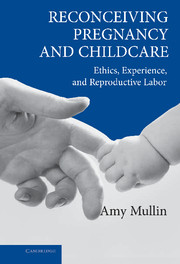6 - Caring for Children, Caring for Friends, Caring by Children
Published online by Cambridge University Press: 05 June 2012
Summary
INTRODUCTION
In the previous chapter, I argued that, rather than thinking about caring for children on a model of mothering, we should recognize and theorize about the different ways in which children receive care. In this chapter I ask what thinking about children and their caregivers in this broader context can reveal to us about other kinds of caring relations. This is in keeping with one of the overarching aims of this book, which has been to recognize the relevance of experiences with reproductive labor to other kinds of experiences.
In this chapter, rather than making a very general claim about connections between caring for children and all other kinds of caring relationships, I choose to compare relations between children and their caregivers with friendships between mature and morally competent adults. My discussion in this chapter is positioned with respect to a debate within feminist theory over the relevance of the mothering relation for thinking about the ethical nature of other human relationships. I distinguish my position both from those who claim that the caregiver-child relation should have a privileged role in theorizing ethical relationships and from those who argue that this relation serves best as a point of contrast to caring relations between adults, rather than a paradigm for them. The concluding section of the chapter examines the way in which “young carers” – school-aged children who provide care to their parents – have been made into a social problem.
- Type
- Chapter
- Information
- Reconceiving Pregnancy and ChildcareEthics, Experience, and Reproductive Labor, pp. 154 - 185Publisher: Cambridge University PressPrint publication year: 2005



